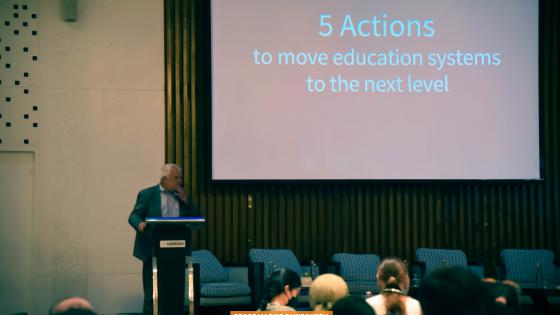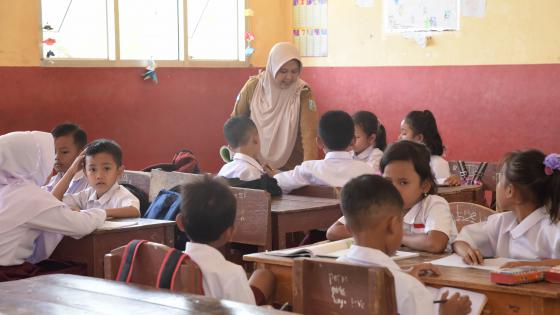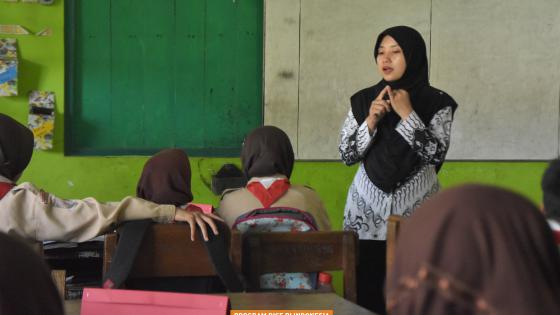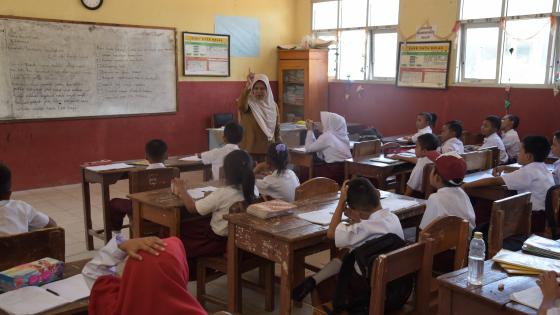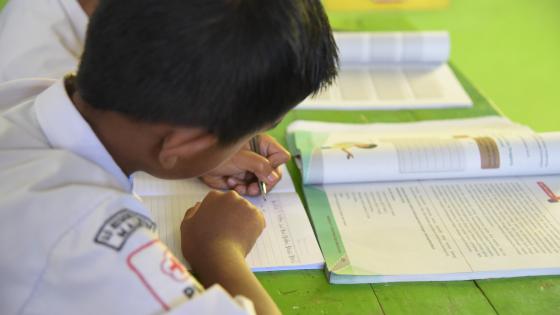Photo: Mukti Mulyana
-
This article is translated from Indonesian. The original article was published in The Conversation Indonesia.
-
Teacher competence and professionalism play an important role in the success of student learning. As long as the government does not prioritise improving the quality of teachers or mapping the competence of teachers, it is difficult to imagine that the quality of education in Indonesia will be better.
One of the evaluation tools used in measuring teacher competence in Indonesia is the Teacher Competence Test (UKG). This test assesses mastery of pedagogic competence; the ability of teachers to manage a class and prepare learning strategies for students; professional competence; teacher mastery of the material; and the ability to evaluate learning.
Based on the results of the 2015 UKG Test, the average teacher competence scores from primary to high school are quite alarming. Nationally, the national average teacher scores are 40.14 (primary school), 44.16 (middle school), and 45.38 (high school). These scores are below the minimum standard set for the year, which was 55. Last year, the minimum standard was raised to 75.
Although the UKG cannot be the only indicator of teacher competence, its result still indicates that many teachers in Indonesia do not have the minimum competence required to facilitate quality learning.
Even with the already layered teacher education, that is, prospective teachers must attend a professional education programme for one year after completing undergraduate education, teacher quality is still unsatisfactory. In a study done by Research on Improving Systems of Education (RISE) Programme in Indonesia in 2018, my colleagues and I found that only 12.43% of primary school teachers thought they had mastered literacy and 21.27% thought they had mastered numeracy.
Last year, this study conducted a self-perception survey of 360 primary school teachers—graduates of Primary School Teacher Education who attended the Teacher Professional Education (PPG) Programme for one year, in-class—in seven universities in Java that hosted education programme. Teachers who participated in the survey had had teaching experience of six months to five years. They are a sample of 2,449 primary school teachers across Indonesia who participated in the programme at 43 universities.
If teachers are not competent in teaching literacy and numeracy at the primary level, it is not surprising that the achievement of Indonesian students in various national and international assessment programmes are in the bottom rank. In the 2015 Programme for International Student Assessment (PISA), for instance, the average math score of Indonesian students was 386, below the average math score of students from 72 PISA participating countries, which was 490.
So, what can be done to improve teacher competence continuously?
The strategic move: mapping teacher competence
The current teacher education system has not been able to generate graduates who possess the competence entailed to become professional educators. In fact, many teachers are still inexpert in the basic skills, such as mastering teaching materials.
At the primary school level, the reality is even more worrying because teachers have to master all subjects—which are the fundamental concept in students’ development at their next level of education.
In the interest of continuous development of teacher competence, the mapping of teacher competence using UKG results as it is exercised today is still imprecise. The current mapping through UKG does not consider the development of teacher competence in different career paths.
To date, the government has yet to map the competence and development stages which teachers at each level—graduate teachers, proficient teachers, highly accomplished teachers, lead teachers—must have. Such a system has been carried out in many developed countries such as Australia to provide a clear picture of the competence required of a teacher and the improvement they must undertake to master them.
The current curriculum of teacher education also calls for a comprehensive review. Its design should be able to equip teachers with deep and extensive knowledge of the material they teach, appropriate teaching skills, and positive attitudes towards diverse learning needs of the students.
What the government have done to improve teacher competence
In the current system, both beginner and experienced teachers take the same development and training programme with types of training that often overlap.
To improve teacher competence, the government organises Teacher Professional Education (PPG) and Continuing Professional Development (PKB) programmes. By participating in those additional education programmes, teachers will get the opportunity to learn the various competence needed to become professional educators.
In 2017, the Ministry of Research, Technology and Higher Education designed two types of PPG based on the targeted groups: pre-service and in-service PPG programme (PPG prajabatan and PPG dalam jabatan, respectively).
The only way for a teacher to obtain a professional educator certificate is to attend the PPG programme. PPG displaces the educator certification programme which uses portfolio collection or teacher professional education and training (PLPG).
Teachers will undergo workshops and internship at a school by making use of their pedagogical competence, content knowledge, communication skill, and character development as professional educators.
The two-semester pre-service PPG programme is intended for novice teacher candidates or inexperienced teachers, and is carried out in-class. Meanwhile, the one-semester PPG programme is for in-service teachers or teachers who have taught in private or state schools, and is conducted by integrating online and in-class learning method. PPG is mandatory for teachers with bachelor’s degree from teacher colleges as well as non-teacher colleges.
The implementation of PPG is not without polemics and has become the talk among academics and practitioners of education. The PPG programme is deemed ineffective for teachers who have undergone teacher training education in college because the materials are merely a repetition of the courses they have obtained in college. With the current model of teacher education, the implementation of regular teacher education and the PPG programme is as though separated.
In the Continuing Professional Development (PKB) programme, the majority of participants are teachers who have obtained professional certification. By participating in a 60-hour PKB education and training programme, teachers are encouraged to improve their capacities in mastering the skills of pedagogy and subject area.
Given that the majority of PKB participants already have professional educator certificates, ultimately, such development design is simply a refreshment of the materials which teachers have previously obtained in college; it has also been failing to develop teacher competence continuously.
Findings of the 2018 RISE study show that despite participating in the PKB training, many teachers were still incapable to meet the minimum competence standard.
The need for proper development
When provided with continuous and proper development, a teacher would have the required competence to facilitate student learning.
Proper and continuous development would not only support teachers in facilitating effective learning, but it would also allow experienced teachers to collaborate with beginner teachers and become mentors for them, so as to create conducive conditions for improving classroom learning.
The quality of an education system will not exceed the quality of its teachers. Improving teacher competence in facilitating learning must be a priority if we want to improve the quality of learning.


